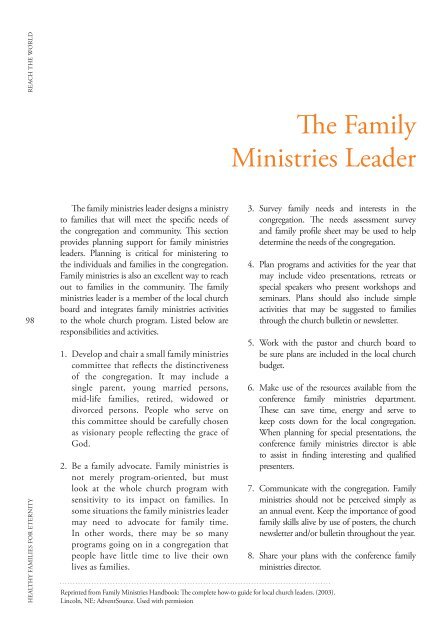HEALTHY FAMILIES FOR ETERNITY
FM_Planbook%202016-eng
FM_Planbook%202016-eng
Create successful ePaper yourself
Turn your PDF publications into a flip-book with our unique Google optimized e-Paper software.
<strong>HEALTHY</strong> <strong>FAMILIES</strong> <strong>FOR</strong> <strong>ETERNITY</strong> REACH THE WORLD<br />
98<br />
The family ministries leader designs a ministry<br />
to families that will meet the specific needs of<br />
the congregation and community. This section<br />
provides planning support for family ministries<br />
leaders. Planning is critical for ministering to<br />
the individuals and families in the congregation.<br />
Family ministries is also an excellent way to reach<br />
out to families in the community. The family<br />
ministries leader is a member of the local church<br />
board and integrates family ministries activities<br />
to the whole church program. Listed below are<br />
responsibilities and activities.<br />
1. Develop and chair a small family ministries<br />
committee that reflects the distinctiveness<br />
of the congregation. It may include a<br />
single parent, young married persons,<br />
mid-life families, retired, widowed or<br />
divorced persons. People who serve on<br />
this committee should be carefully chosen<br />
as visionary people reflecting the grace of<br />
God.<br />
2. Be a family advocate. Family ministries is<br />
not merely program-oriented, but must<br />
look at the whole church program with<br />
sensitivity to its impact on families. In<br />
some situations the family ministries leader<br />
may need to advocate for family time.<br />
In other words, there may be so many<br />
programs going on in a congregation that<br />
people have little time to live their own<br />
lives as families.<br />
The Family<br />
Ministries Leader<br />
3. Survey family needs and interests in the<br />
congregation. The needs assessment survey<br />
and family profile sheet may be used to help<br />
determine the needs of the congregation.<br />
4. Plan programs and activities for the year that<br />
may include video presentations, retreats or<br />
special speakers who present workshops and<br />
seminars. Plans should also include simple<br />
activities that may be suggested to families<br />
through the church bulletin or newsletter.<br />
5. Work with the pastor and church board to<br />
be sure plans are included in the local church<br />
budget.<br />
6. Make use of the resources available from the<br />
conference family ministries department.<br />
These can save time, energy and serve to<br />
keep costs down for the local congregation.<br />
When planning for special presentations, the<br />
conference family ministries director is able<br />
to assist in finding interesting and qualified<br />
presenters.<br />
7. Communicate with the congregation. Family<br />
ministries should not be perceived simply as<br />
an annual event. Keep the importance of good<br />
family skills alive by use of posters, the church<br />
newsletter and/or bulletin throughout the year.<br />
8. Share your plans with the conference family<br />
ministries director.<br />
Reprinted from Family Ministries Handbook: The complete how-to guide for local church leaders. (2003).<br />
Lincoln, NE: AdventSource. Used with permission


